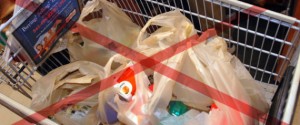After eight years of failed legislative attempts to ban plastic grocery bags, Gov. Jerry Brown signed a bill in September to ban and tax plastic and paper grocery bags. The new statewide plastic bag ban is scheduled to go into effect July 15, 2015… but not so fast…
Immediately after the bill signing, the American Progressive Bag Alliance announced it would gather signatures for a November 2016 ballot initiative to repeal the bill to block implementation of the statewide ban. They got their wish – the bag initiative just qualified for the 2016 ballot, with at least 555,236 valid voter signatures on the referendum petition. Implementation of the law will be frozen until the November 2016 vote.
SB 270 was authored by former State Sen. Alex Padilla, D Pacoima, and co-authored by Sen. President pro Tem Kevin de León, D-Los Angeles, and Sen. Ricardo Lara, D-Los Angeles. The new law bans the recyclable plastic bags and replaces them with heavier plastic bags, five times thicker. It is unclear how a significantly thicker plastic bag is better for the environment.
Padilla was just elected California Secretary of State in the November election.
Why Wait for a new state law?
Sacramento Mayor Kevin Johnson announced in December he planned to push for quick adoption of a citywide ban on single-use plastic bags if plastic bag manufacturers are successful in qualifying the ballot measure to repeal the bag ban. However, local jurisdictions will be allowed to enact their own bans in the interim.
Mayor Johnson serves as the Chairman of Resilient Communities for America, which claims “A sharp increase in extreme weather events driven by climate change is costing us billions and testing our city and county governments.” The dubious organization’s funders and founders page reads like a Who’s-Who in leftist global warming schemes, including the California Air Resources Board, Center for American Progress, The Climate Action Reserve, The Climate Registry, the United States Department of State, US Department of Energy, Environmental Protection Agency, United States Green Building Council, Earth Day Network.
Apparently banning plastic bags in Sacramento is Johnson’s call for local action on climate change.
Grocers stand to make millions
Without the initiative to repeal SB 270, grocers would be allowed to charge a minimum of 10 cents each for paper and thicker plastic bags, and pocket the money. A fee of $.10 per bag does not sound like much but would serve to punish low-income folks, and the working poor, more than others. A cleaner environment is a valuable goal. The question is whether solutions that impose more challenging costs on the working poor, with debatable environment outcomes, are the best way to proceed.
The legislation ignored the fact that a huge portion of grocery and retail plastic bags are reused as garbage pail liners, pet-waste disposal bags, lunch bags, trash bags, dispose of kitchen grease, dispose of dirty diapers, hold wet clothes, and a myriad of other uses. These secondary uses of plastic grocery bags are beneficial to the environment in that they prevent the manufacture and purchase of more plastic bags.
The American Chemistry Council estimates SB 270 would amount to a $1 billion tax and threaten 500 jobs in the plastic bag manufacturing business.
Plastic bags better for the environment
Plastic bags amount to less than 0.5 percent of the waste stream, and a similarly miniscule amount of landfill space.
A study by the National Center for Policy Analysis found it is better for the environment to reuse plastic bags as garbage pail liners rather than to recycle them because of the environmental “benefits of avoiding the production of the bin liners they replace.” According to the study, an examination of the bag bans and budgets for litter collection and waste disposal in San Francisco, San Jose, the City and County of Los Angeles, Washington, D.C., and Brownsville and Austin, Texas, shows no evidence of a reduction in costs attributable to reduced use of plastic bags.
But the facts didn’t stop Mayor Johnson. “In addition to harming wildlife and causing urban blight, single-use plastic bags cost Sacramento hundreds of thousands of dollars each year,” said Johnson. “They cause problems by clogging up our recycling equipment, forcing it to be shut down on a regular basis. And we’re forced to use parks and other city personnel to clean up plastic bag pollution all over the city every day. These single-use plastic bags didn’t exist 40 years ago, and we want to make sure they don’t exist in Sacramento in the near future.”
Johnson apparently never got the memo –
The environmental myths, exaggerations and misinformation that have been spread about plastic bags have led many to believe that plastic bags kill 100,000 sea mammals and one million seabirds each year. Even David Santillo, a marine biologist at Greenpeace, disagrees: “It’s very unlikely that many animals are killed by plastic bags. The evidence shows just the opposite.”
Plastic bag manufacturers argue that careless people cause the litter problem; wouldn’t enforcing litter laws go much further to helping the environment?


